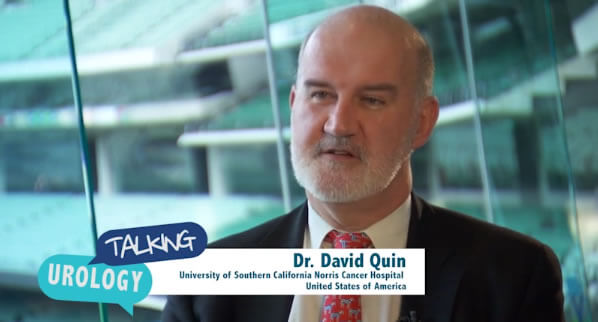In this ANZUP conference highlight, this year’s convenor David Pryor chats to Phuoc Tran, a radiation oncologist from John Hopkins, about his success with the Oriel trial of stereotactic radiation for patients with oligometastatic prostate cancer.
Dr Phuoc Tran is an associate professor of radiation Oncology and Molecular Radiation Sciences at John Hopkins University. He has co-appointments in the Sidney Kimmel Comprehensive Cancer Centre, Medical Oncology, The Jame Buchanan Brady Urological Institute, the Cellular and Molecular Medicine Program and is co-director of the SKCCC Cancer Invasion and metastasis Program. Phuoc is a board-certified radiation oncologist and clinically specialises in the treatment of genitourinary malignancies.
Talking Urology podcast transcript
ANZUP 2019 Interviews – Phuoc Tran and David Pryor
David Pryor: So, I’m here with Phuoc Tran, radiation oncologist from Johns Hopkins. He’s one of our esteemed international speakers here at the ANZUP ASM. Phuoc, welcome very much.
Phuoc Tran: My pleasure. Thank you for having me.
David: Glad to have you in the country. One of our sessions this morning touched on the topic of the oligometastatic state and how we might manage oligometastatic prostate cancer and you yourself have done a trial in this space. Tell us about the ORIOLE trial which you touched on today.
Phuoc: Sure. Thank you again for having me David to this wonderful meeting. So, the ORIOLE trial which stands for observation versus stereotactic ablative radiation for all go metastatic prostate cancer patients was really borne out of this hypothesis by Ralph Weichselbaum and Sam Helman suggesting that metastasis is not a binary state but rather a spectrum with shades of grey. The emergence of technology such as stereotactic ablative radiation has allowed us to re-examine this hypothesis in a more robust fashion and ORIOLE is a phase 2 randomized study of observation versus SABR in patients with three or less metastases that are oligo recurrent. There have been a number of studies that are reported out in the last year, so including STOMP from Piet Ost in Belgium as well as the SABR comment study which is a multi-institutional study looking at metastasis-directed therapy such as SABR in the setting of oligometastatic patients in the context of prostate cancer and a number of others studies in non-small cell lung cancer and the case of SABR common for a variety of histologies.
Our study was exclusively oligometastatic or oligo recurrent prostate cancer patients randomized in a 2:1 fashion to SABR versus observation. The final data suggests that progression-free survival is extended in patients with SABR and probably more importantly in our study, were able to collect a number of correlatives circulating tumor cells, circulating tumor DNA, next generation functional imaging in the. context of PSMA, PET/CT as well as look at the immune system using techniques such as T-cell repertoire sequencing.
David: So, Phuoc that’s certainly what I found to be the most interesting. We obviously know that this is going to be a heterogenous group. There’s going be some people who you could give metastasis‑directed therapy to and they’ll be disease free for many years. But then there’s also going to be a cohort who will rapidly progress. So, what’s your group doing to try and tease that out?
Phuoc: Sure. In collaboration with Max Dean who’s also a radiation oncologist at Stanford, he developed arguably the most sensitive circulating tumor DNA technique using next gen sequencing approaches, at least preliminarily our data had been able to suggest that patients with certain mutations do not seem to benefit from stereotactic ablative radiation in the oligo recurrent space. Now that needs to be validated in another prospective cohort but it’s very exciting for us.
David: Now, one final question. You seemed very adept at generating acronyms for your trial. So, this first trial ORIOLE, can you tell us a bit about that?
Phuoc: Yes, yes. For those who are familiar with the American sports infrastructure, one American sports pastime is baseball and at least Johns Hopkins is located in the America’s greatest city, Baltimore. That is actually how it’s known locally and our local baseball team are the Orioles. Our follow up trial I think that’s your cue to talk about the follow up trial to ORIOLE is a trial where we’re looking at stereotactic ablative radiation and then randomizing patients to either placebo or Xofigo. That trial has a very catchy name known as Ravens and another type of sport that we have in the United States is American football and the Baltimore team is the Ravens.
David: Now, I’ve just heard over the break that the Orioles aren’t actually that good as a baseball team. Is there any correlation you think between the success of the code and your recruitment to the trials?
Phuoc: I hope not and I’m sure the Ravens really hope not. But yes, unfortunately the Orioles baseball team are not doing well this year. They’re in a rebuilding mode, but they do have a very storied history of many world championships, meaning MLB championships. But yes, we’re in a rebuilding mode. And no, I emphatically denounce that notion.
David: Okay, Phuoc Tran, thank you very much for your time and we look forward to the rest of your talks during the meeting
Phuoc: Thank you very much David. Thank you.










